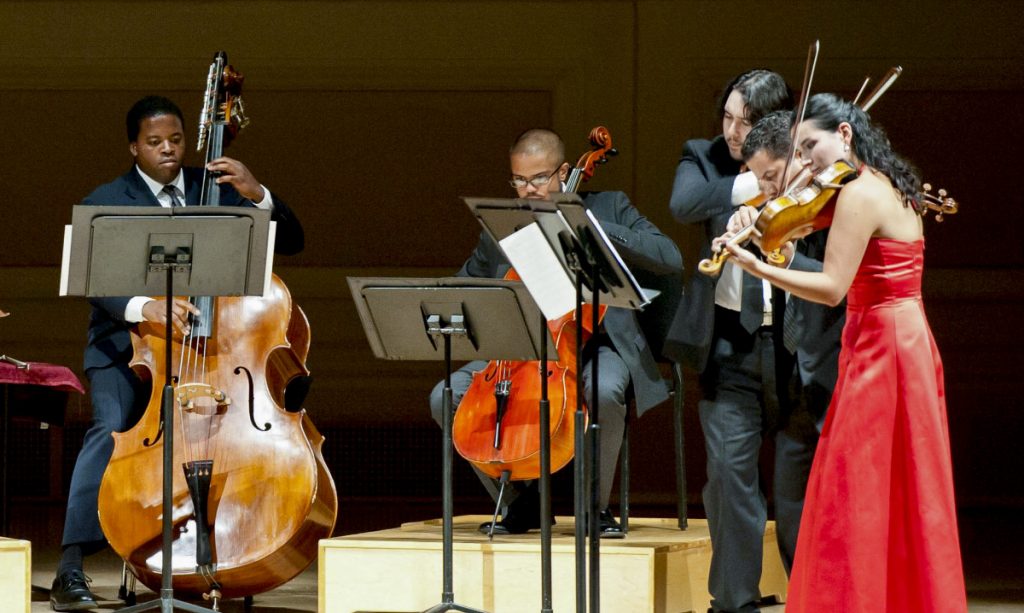NICHOLE JIANG – STAFF WRITER

Creating music and opportunity through the arts is the heart of what the Sphinx Organization strives for. This organization aims to address the underrepresentation of people of color in the classical music world by supporting diversity from music education, to the artists onstage and the works being performed. The organization includes several different performing programs, including the Sphinx Virtuosi, a professional chamber orchestra of 18 Black and Latinx musicians. Several members of the Sphinx Virtuous, known as the Sphinx Artists, will perform at 8:15 p.m. Aug. 19 in the Amphitheater.
Founded in 1997, the Detroit-based organization has helped transform countless lives through the arts. The name itself comes from the mythical Sphinx that represents power and wisdom. These characteristics reflect not just the members of the organization, but the music and art that is being created.
“One of the amazing things I’ve been able to do is both teach students of color, and also perform. One of my favorites is the Carnegie Hall gala every year,” said Jannina Barefield Norpoth, a violinist of Sphinx Artists. “Sphinx has always made an incredible effort to do a lot of engagement, and get a lot of students from different schools to come. These kids show up at Carnegie Hall, and most of them have never been here before, and then when this orchestra of all Black and Latinx string players walk out on stage, you would think it was like a rock star walking into an arena.”
The organization also offers music education as a way to open new doors and opportunities.
“Many of these students, they’re the only person of color at their school in their program, and they go through this affirmation of identity because they question themselves, like, ‘Do I belong here, and do I belong in this situation?’ ” Norpoth said. “Many of them have actually experienced discrimination from their teachers or their classmates, and so coming into this program, they get this sense of affirmation, and then they get the sense of belonging, and they have this confidence that they then are able to bring back to their communities.”
The world of classical music tends to lack diversity and representation of people of color, and the Sphinx Organization hopes to change that.
“The organization’s mission is to promote diversity in classical music. And that’s changing who’s on the stage, that’s helping prepare people for jobs, that’s changing people’s perception of musicians of color, and it’s also sharing music by composers of color that people might not have heard before — works that haven’t made their place in the repertoire, perhaps, the way they ought to have,” Norpoth said.
These aspects are what make tonight’s performance so dynamic, as the community gets to experience newer pieces that usually don’t get the chance to be heard.
“This program that we’re playing, it’s a really fun and exciting program. The first work is actually by a Sphinx alumni. It’s a really beautiful piece, and we open the program with that,” Norpoth said. “We’re also playing Coleridge Taylor Perkinson’s Sinfonietta No. 1, which is a really great piece. He was very well versed in both jazz and classical, and his music is really bluesy and beautiful. It’s very classical and reminiscent of Bach and the way he uses fugues, but also infuses all these jazz and blues harmonies into the piece.”
The program also spotlights the cellist Tommy Mesa, who will perform a solo piece, “Seven,” by composer Andrea Casarrubios.
“She’s such a talented composer and it’s a super gorgeous piece. It’s my favorite part of the program,” Norpoth said.
The program will also include traditional classical repertoire that the audience will be able to recognize. These include Samuel Barber’s “Adagio for Strings” and the final movement of Dvořák’s American String Quartet.
Featuring newer works on tonight’s program is a way to showcase a broader repertoire, and spotlight the talents of composers and musicians that aren’t represented equally onstage.
“I love Beethoven, Mozart and Bach, but there’s just so much repertoire that makes up classical music,” Norpoth said. “There are … so many incredible artists who are writing music right now for classical musicians. That is exciting, and there’s so many women composers and composers of color. Because of the nature of classical music and existing for so many hundreds of years, and going through time periods, it would be very difficult to be a woman in classical music and to be a Black person in classical music,” she said.
“In spite of that, there’s a lot of music that actually exists, and it either just didn’t become popular because people didn’t take it seriously, or they didn’t publish it — but it’s findable and really worth looking for and performing.”
Musicians from the Sphinx Organization have performed for Chautauqua in the past. However, tonight’s performance is the first time for this group of musicians, and they’re excited to share their message through music with the community, using the more intimate setting of a chamber ensemble.
“I play in the chamber ensemble all the time. It’s what I love to do because it’s like the classical version of a rock band. It’s a small ensemble but you also get your solo moments, and you get this more intimate experience of playing music with just a few people,” Norpoth said. “It’s kind of like being surrounded by friends and also playing music, so for me, it’s really the best.”




